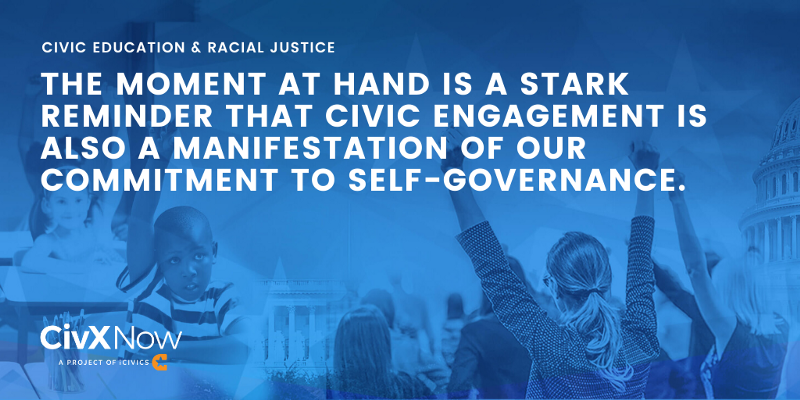“Contrary to our idealistic normative assumptions, citizens do not have a principled or ideologically constrained approach to democracy…Instead, most citizens are prone to understand democracy through the lens of group membership…” (Edsall, Thomas NYT August 26, 2020 quoting research from Alexandra Filindra, political scientist at the University of Illinois-Chicago).
This is precisely why we need to teach civics intensively, intentionally focusing beyond “group membership” and towards anchoring healthy democratic norms that will secure our common purpose.
The past couple of months have shown us that there’s a lot of work ahead for the field of civic education. Increased civil unrest, the prevalence of false information, and the pervasive gridlock and partisanship in government continue to chip away at our democracy. Our work is now more important than ever!
We continue to witness the passion of student civic engagement on and offline. This generation won’t wait, and they continue to rise to the occasion in a world of unknowns. This month, iCivics’ Director of Social Engagement, Amber Coleman-Mortley, moderated a conversation with Generation Citizen’s Scott Warren, IGNITE National’s Sara Guillermo, and Kidizenship’s Amanda Little on the future of democracy in our country and how we can prepare our youth to save it. Listen to Gen Z and the Future of Democracy on the Commonwealth Club podcast.
Last month, Amber also spoke on a panel hosted by the Center for Strategic and International Studies (CSIS), Civics as a National Security Imperative: Addressing Racial Injustice, with leading civics and racial justice experts. The first day of the event focused on the specific ways in which domestic issues of race and inequality also have a broader impact on our national security. On the second day, Amber was joined by CivxNow Coalition members Danielle Allen of the Edmond J. Safra Center for Ethics at Harvard University, Shawn Healy of the Robert R. McCormick Foundation, and Andrew Wilkes of Generation Citizen in a discussion on how civics and civic engagement can address racial injustice and build societal resilience. It was quite clear from the discussion that civic education is part of the solution to solving the injustices in our society; building the social fabric of our nation through cross-cultural and cross-racial coalitions; restoring trust in our democratic principles; and equipping individuals with the knowledge and skills necessary for justice-oriented civic work.

To that end, we would like to learn from each other regarding best practices in diversity, equity, and inclusion, and illuminate the role that CivxNow and our Coalition partners can play in both internal and external equity work. We are inspired by our nation’s young people and want to take their lead in being a part of the solution. Read more about racial justice and the work we need to do.
You can also share your support for civic education and racial justice by using our social media kit!


 See All
See All